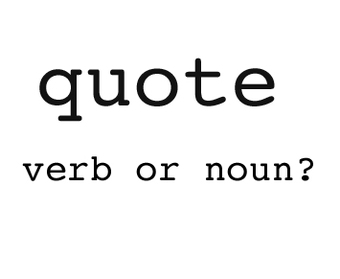
Is "quote" a verb? Must "quotation" always be used when referring to the actual words quoted?"
The answer to that question depends on whom you ask. This is one of those thorny language issues that grammarians do not agree on. Some linguists cry foul, because they view it a solecism to use quote as a noun. Here's my take:
Historical use: quote & quotation
While the word quote has been used as a verb (Can I quote you on that?) since the 1500s, my research indicates its use as a noun (I need a pithy quote for my newspaper story.) dates as far back as the late 1880s. Even though quote has become a colloquialism synonymous with quotation, some linguists insist that quotation is the only acceptable noun form. As a moderate descriptivist, I'm all for using quote as a noun. I believe that language evolves and, in most cases, we should not impede that evolution.
What about rules?
I am not advocating that we throw out grammar and writing rules with reckless abandon (and don't even get me started on those "rules" that aren't really rules at all.) I am not saying that "anything goes" when it comes to language. In fact, I am a staunch supporter of adhering to the rules — the "real" rules. Some wordsmiths have suggested that we do away with the use of whom. I would argue that just because many of us don't know when to use whom instead of who is no reason to abandon a perfectly good word; we simply need to learn the difference between the two. (That's a post for another day.)
Not all black & white
The more I study language and grammar, the more I realize there are many gray areas in the world of words. We may desire the comfort of rules to always tell us we've written (or spoken) something correctly, but the truth is that not everyone agrees on what's right and what's wrong. (Who would have thought grammar could be so much like politics and religion?)
What to do?
So, dear reader, if you want to use quote as a noun, I say go for it. Just be advised that prescriptivists out there may correct you (and judge you). Of course, now you have a ready answer to refute their pedantic protestations. (Yes, I love alliteration.) And while you're at it, you might even want to split a few infinitives, start a sentence with a conjunction or end one with a preposition. Just please don't dangle any modifiers; that is a solecism up with which I will not put.
What are your thoughts on using quote as a noun? Lively debate is welcome; incivility is not. Share your thoughts in the Comments below. If you have a writing, grammar or language question, please share it here for consideration on this blog.

